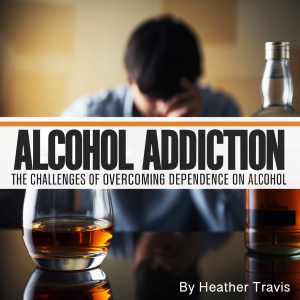

Alcohol Addiction
Heather Travis
This audiobook is narrated by a digital voice.
In the heart of every celebration, commiseration, and casual social gathering across the globe sits a substance that simultaneously brings people together and tears lives apart. Alcohol occupies a unique position in human society as the only addictive drug that is not only legal and widely available, but actively promoted and celebrated as an essential component of adult life. This cultural paradox creates one of the most complex addiction challenges of our time, where the very substance that destroys millions of lives is woven so deeply into the fabric of social interaction that questioning its role seems almost revolutionary.
The history of alcohol and human civilization is inextricably linked, stretching back over 9,000 years to the earliest agricultural societies. Archaeological evidence suggests that the cultivation of grains may have been motivated as much by the desire to produce fermented beverages as by the need for food. Ancient civilizations from Egypt to China developed sophisticated brewing and distilling techniques, and alcohol became integrated into religious ceremonies, social rituals, and daily life in ways that persist to this day.
The relationship between alcohol and culture evolved differently across societies, but common threads emerged that continue to influence contemporary attitudes toward drinking. Alcohol became associated with hospitality, celebration, relaxation, and social bonding. It was used as currency, medicine, and spiritual sacrament. These historical associations created deep psychological and cultural connections that make alcohol addiction particularly challenging to address, as the substance is not merely a drug but a symbol of belonging, adulthood, and social acceptance.
Duration - 53m.
Author - Heather Travis.
Narrator - Digital Voice Mia G.
Published Date - Thursday, 23 January 2025.
Copyright - © 2025 Heather Travis ©.
Location:
United States
Description:
This audiobook is narrated by a digital voice. In the heart of every celebration, commiseration, and casual social gathering across the globe sits a substance that simultaneously brings people together and tears lives apart. Alcohol occupies a unique position in human society as the only addictive drug that is not only legal and widely available, but actively promoted and celebrated as an essential component of adult life. This cultural paradox creates one of the most complex addiction challenges of our time, where the very substance that destroys millions of lives is woven so deeply into the fabric of social interaction that questioning its role seems almost revolutionary. The history of alcohol and human civilization is inextricably linked, stretching back over 9,000 years to the earliest agricultural societies. Archaeological evidence suggests that the cultivation of grains may have been motivated as much by the desire to produce fermented beverages as by the need for food. Ancient civilizations from Egypt to China developed sophisticated brewing and distilling techniques, and alcohol became integrated into religious ceremonies, social rituals, and daily life in ways that persist to this day. The relationship between alcohol and culture evolved differently across societies, but common threads emerged that continue to influence contemporary attitudes toward drinking. Alcohol became associated with hospitality, celebration, relaxation, and social bonding. It was used as currency, medicine, and spiritual sacrament. These historical associations created deep psychological and cultural connections that make alcohol addiction particularly challenging to address, as the substance is not merely a drug but a symbol of belonging, adulthood, and social acceptance. Duration - 53m. Author - Heather Travis. Narrator - Digital Voice Mia G. Published Date - Thursday, 23 January 2025. Copyright - © 2025 Heather Travis ©.
Language:
English
Chapter 1: The Cultural Paradox of Alcohol
Duration:00:08:58
Chapter 2: The Neuroscience of Alcohol Dependence
Duration:00:09:56
Chapter 3: Recognizing the Descent into Dependence
Duration:00:10:29
Chapter 4: The Journey to Recovery
Duration:00:11:55
Chapter 5: Building a Society That Supports Recovery
Duration:00:11:44